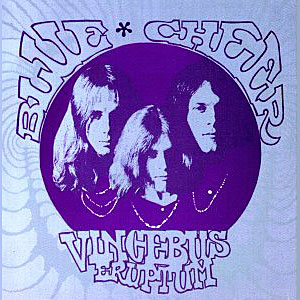 Students of mine who have struggled to make sense of ancient or Anglo-Saxon history, when the evidence is severely limited, may be interested or amused at what seems to be a controversy about the origins of heavy metal music.
Students of mine who have struggled to make sense of ancient or Anglo-Saxon history, when the evidence is severely limited, may be interested or amused at what seems to be a controversy about the origins of heavy metal music.I was alerted to this debate by an article in the British newspaper the Guardian, in which Joe Queenan, commenting on a film documentary called Metal: A Headbanger's Journey, by Sam Dunn and Scott McFadyen, casts doubt on the filmmakers' contention that an obscure, one hit wonder band called Blue Cheer deserves to be recognized as the originators of heavy metal. I was flabbergasted that anyone should think this. We are talking about 1968, when I was about the age of many of my students now: in other words, the age when music really matters. I was a big fan of loud, "hard rock," "psychedelic" music and the San Francisco sound, and today when I read Queenan's article, I couldn't even dredge up the slightest memories of Blue Cheer (and no, it has nothing to do with my non-existent drug-taking). Though I remember their hit Summertime Blues, a cover of an earlier rockabilly (!) record.
But sure enough, you can find on the Web the many champions of the claim that these guys were the source of heavy metal (see, for instance, the Wikipedia entry for Blue Cheer). I don't buy it; if the patriarchs of metal are not Black Sabbath, then there are plenty of people in 1967-8 who contributed more to the metal sound. Let me cite only three: Jimi Hendrix, Jimi Hendrix, and Jimi Hendrix. (As this web-site points out, Blue Cheer were pretty derivative of Hendrix.) I'm not excluding any influence, but others surely were more influential (Iron Butterfly, even maybe the pretty laughable in retrospect Vanilla Fudge).
Why is this on Early History? It strikes me that if we can't agree on something this recent and well-recorded as this phenomenon, how well can we do for the 8th century, or the 8th century BC? How many jokes, to take one point, lie undetected in our sources?
Yet despite our problems with determining facts and influences, I still say, Blue Cheer, bah. Just look at that album cover.
I remember Blue Cheer! Perhaps in concert they were emotive and expressive in such a way that they inspired others. I love that cover art! Maybe someday there will need to be experts in historical scripts and documents to read those bubble letters. Already there are those who can read "tag" and those who can't (and I'm a "can't," though I'm fluent in 60's poster lettering).
ReplyDeleteI love the cover art style, too, but I don't think this is a particularly good example. See this contemporary cover from one of my favorite albums.
ReplyDeleteI'd buy the in concert argument if famous early metal musicians made that claim. Then I'd have to withdraw my comments. :-)
Here's the cover:
ReplyDeletehttp://bp3.blogger.com/_kEVcy0rQ4Wk/Rmshvtz4qaI/AAAAAAAADLs/FZ0zCD5iEyM/s1600-h/Quicksilver+Messenger+Service+-+Quicksilver+Messenger+Service+(1968).jpg
A last try:
ReplyDeletehttp://tinyurl.com/2u9qfb
I like that album, but a lot of it is rather aimless jamming. Exceptional musicians, apparently recorded through a tunnel of felt after the drummer's drums had been taken away and replaced with packing crates of various sizes. I don't think it's very metal, but it is very heavy.
ReplyDeleteHeavy metal really is a contested parenthood. Sabbath, Led Zeppelin and Deep Purple all did things that sound a lot like later heavy metal; a lot of nineties extreme stuff seems to owe more to Blue Öyster Cult and Atomic Rooster. I've been known to maintain that really it all starts with the Kinks' `All Day And All of the Night', just for the guitar riff frenzy idea, but when there's as much disagreement as there be about what heavy metal actually is it's actually possible to defend that.
Basically, if there's a lesson for early historians here I think it's that having adequate source material just complicates things ;-)
P.S. I've got more than a bit of Latin but I've never been sure what on earth Blue Cheer thought their title there meant. Also, a friend once challenged me to provide a Latin translation of "Kick out the Jams, [brothers and sisters]" and if anyone wants to offer suggestions there I'd be grateful...
Jonathan, there must be some obscure phrase in the Satyricon that could be translated to mean "Kick out the jams..." just as easily as anything else.
ReplyDeleteIf it were Greek, there would be some unique passage of Aristophanes that would do.
For that matter, try translating "Kick out the jams" into contemporary English!
Hey, I forgot to mention, I actually saw Blue Cheer in April. I'm afraid the lesson of that performance was that though there may be some bands that can still get up there and rock out after forty years, this was not one of them. But I guess it keeps them in guitar strings, leather jackets and comfortable armchairs.
ReplyDeleteAs for KOtJ, one English translation would be simply "Now stop messing around!" but that fails to include any of the Illuminatus! double entendre. I think trying to get that into the Latin may be beyond anyone, however.
Volvate vacillateque, that's what I say!
Wow, amazing block structure! How long
ReplyDeleteHave you written a blog before? Working on a blog seems easy.
The overview of your website is pretty good, not to mention what it does.
In the content!
vstcracked.net
MakeMKV Crack
Synergy Crack
Sibelius Mac crack
Albino Crack
Guitar Pro Crack